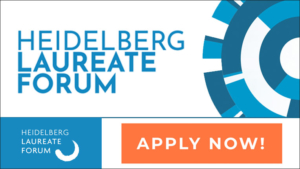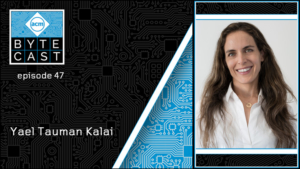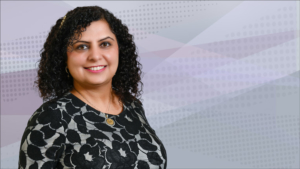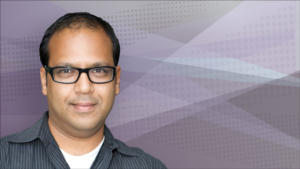Young Researchers: Apply for the 11th Heidelberg Laureate Forum
 Young researchers are invited to apply for one of 200 coveted spots to participate in the 11th annual Heidelberg Laureate Forum (HLF). The invitation is open to undergraduates, graduate students and recent PhDs of mathematics and computer science (and closely related fields).
Young researchers are invited to apply for one of 200 coveted spots to participate in the 11th annual Heidelberg Laureate Forum (HLF). The invitation is open to undergraduates, graduate students and recent PhDs of mathematics and computer science (and closely related fields).
The HLF offers all accepted young researchers the great opportunity to personally meet the winners of the most prestigious prizes in their fields. For one week, recipients of the ACM A.M. Turing Award and the ACM Prize in Computing (Computer Science), the Abel Prize, Fields Medal and IMU Abacus Medal (Mathematics) will engage in a cross-generational scientific dialogue with young researchers in Heidelberg, Germany.
The 11th HLF will take place on 22-27 September 2024. This prominent and versatile event combines scientific, social and outreach activities in a unique atmosphere, and is fueled by comprehensive exchange and scientific inspiration.
To be considered for participation, young researchers can either apply directly or be nominated by a colleague, professor, mentor, or manager. Applications must be submitted online by Friday 9 February 2024 via the application page.
Successful candidates will be selected by an international committee of experts to ensure that the most qualified candidates are invited. Those who are accepted will be notified by the end of April 2024.
Featured ACM Member: Janet Haven
 Janet Haven is the Executive Director of Data & Society, a non-profit organisation with a mission to advance public understanding of the social implications of data-centric technologies, automation and AI. She is also a member of the (US) National Artificial Intelligence Advisory Committee. Haven started her career in technology startups in central Europe and lived in the region for more than 15 years, deepening her understanding of the ways the internet and algorithmic technologies impact societies outside the US. For ACM, she serves as a member of the ACM US Technology Policy Committee (ACM USTPC).
Janet Haven is the Executive Director of Data & Society, a non-profit organisation with a mission to advance public understanding of the social implications of data-centric technologies, automation and AI. She is also a member of the (US) National Artificial Intelligence Advisory Committee. Haven started her career in technology startups in central Europe and lived in the region for more than 15 years, deepening her understanding of the ways the internet and algorithmic technologies impact societies outside the US. For ACM, she serves as a member of the ACM US Technology Policy Committee (ACM USTPC).
In her interview, she discusses her research and advocacy at the intersection of public policy and technology, AI regulation, her work with Data & Society, and more.
Featured ACM Member: Alfons Kemper
 Alfons Kemper is a Professor of Database Systems at the Technical University of Munich and Principal Technical Advisor at Tableau/Salesforce. His research interests focus on advanced, scalable database and data exploration systems. Together with his colleague Thomas Neumann, Kemper led the development of the innovative New-SQL database system HyPer—a main memory database system that was acquired by Tableau Software. Neumann’s and Kemper’s group is currently working on its successor, Umbra.
Alfons Kemper is a Professor of Database Systems at the Technical University of Munich and Principal Technical Advisor at Tableau/Salesforce. His research interests focus on advanced, scalable database and data exploration systems. Together with his colleague Thomas Neumann, Kemper led the development of the innovative New-SQL database system HyPer—a main memory database system that was acquired by Tableau Software. Neumann’s and Kemper’s group is currently working on its successor, Umbra.
In his interview, he discusses how the focus of his lab is unique within the field, a key innovation in the development of HyPer, and more.
ACM ByteCast: Yael Tauman Kalai
 In this episode of ACM ByteCast, Bruke Kifle hosts 2022 ACM Prize in Computing recipient Yael Tauman Kalai, Senior Principal Researcher at Microsoft Research and an Adjunct Professor at the Massachusetts Institute of Technology. Her main research interests are cryptography, the Theory of Computation, and security and privacy.
In this episode of ACM ByteCast, Bruke Kifle hosts 2022 ACM Prize in Computing recipient Yael Tauman Kalai, Senior Principal Researcher at Microsoft Research and an Adjunct Professor at the Massachusetts Institute of Technology. Her main research interests are cryptography, the Theory of Computation, and security and privacy.
Here, Yael shares her career journey in computer science and how the field of cryptography provided philosophically interesting questions with applicable research outcomes. She describes her work on ring signatures, a key component of numerous blockchain-based systems that added privacy to the chain, touches on AI and large language models (LLMs), different methods of verification, and how she values her own work. She also reveals some concerns around quantum computing and what she sees as the most exciting emerging areas of cryptography, and much more.
Listen to ACM ByteCast interviews here, or wherever you get your podcasts.
ACM TechTalk – “Towards Seamless Collaboration: Redefining Human-AI Interaction in Programming” with Sandeep Kaur Kuttal
 Register for the ACM TechTalk: “Towards Seamless Collaboration: Redefining Human-AI Interaction in Programming,” 20 December 2023, 12:00 pm EST ( 5:00 pm UTC) with Sandeep Kaur Kuttal.
Register for the ACM TechTalk: “Towards Seamless Collaboration: Redefining Human-AI Interaction in Programming,” 20 December 2023, 12:00 pm EST ( 5:00 pm UTC) with Sandeep Kaur Kuttal.
In the current era, with the rise of “Agents”—particularly tailored Large Language Models (LLMs) for programmers—the optimisation of Human-Agent collaboration stands as a critical imperative for elevating programmer productivity. This talk will delve into the complexities of attaining seamless interaction between humans and Agents, encompassing three pivotal dimensions: (1) the design of effective programming Agents, (2) the influence of gender, particularly in verbal interactions with an agent, and (3) the dynamics inherent in programmer-agent collaboration. Exploring the challenges and opportunities posed by these agents for programmers and the ensuing impact on code quality, Kuttal will navigate the evolving landscape of collaborative programming paradigms with agents.
NOTE: New procedure requires registrants to log in with their ACM Accounts and help ACM gather some demographic information before accessing the registration link.
View on Demand – ACM TechTalk: “Unpredictable Black Boxes are Terrible Interfaces” with ACM Fellow Maneesh Agrawala
 The ACM TechTalk “Unpredictable Black Boxes are Terrible Interfaces” with ACM Fellow Maneesh Agrawala, ACM Fellow and Forest Baskett Professor of Computer Science at Stanford University, is now available on demand.
The ACM TechTalk “Unpredictable Black Boxes are Terrible Interfaces” with ACM Fellow Maneesh Agrawala, ACM Fellow and Forest Baskett Professor of Computer Science at Stanford University, is now available on demand.
Modern generative AI models are capable of producing surprisingly high-quality text, images, video, and even program code. Yet the models are black boxes, making it impossible for users to build a mental model for how the AI works. Users have no way to predict how the black box transmutes input controls into the output text, images, video, or code. In this talk, Agrawala asserts that such unpredictable black boxes are terrible interfaces and that the ambiguity of natural language and a lack of shared semantics between AI models and human users are partly to blame and will suggest approaches for improving the interfaces to the AI models. View on demand here.
Visit the TechTalks Archive for our full listing of past TechTalks.





